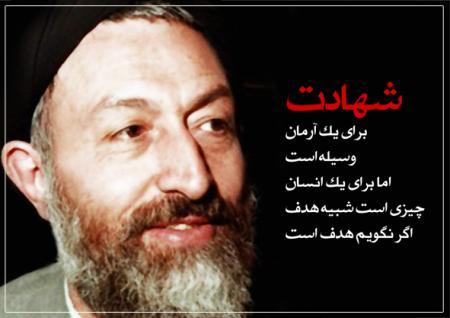
|
Personal details |
|
|
Born |
|
|
Died |
|
|
Nationality |
|
|
Political party |
|
Seyyed Mohammad Hosseini Beheshti ; 24 October 1928 – 28 June 1981 was an Iranian jurist, philosopher, cleric and politician who was known as the second person in the political hierarchy of Iran after the revolution. Dr. Beheshti is considered to have been the primary architect of Iran's post-revolution constitution, as well as the administrative structure of the Islamic Republic. Beheshti was assassinated along with more than 70 members of the Islamic Republic Party on 28 June 1981.
Beheshti is also known to have selected and trained several prominent politicians in the Islamic Republic, such as current President Hassan Rouhani, former President Mohammad Khatami, Ali Akbar Velayati, Mohammad Javad Larijani, Ali Fallahian, and Mostafa Pourmohammadi. Beheshti also served as the Secretary General of the Islamic Republic Party, and was the head of the Iranian judicial system. He further served as Chairman of the Council of Islamic Revolution, and the Assembly of Experts. Beheshti earned a Ph.D. in Philosophy, and was fluent in English, German and Arabic. Following his death, Ayatollah Khomeini referred to Beheshti as a person who was "as a nation for us."
Early years and education
Beheshti was born in Isfahan in 1928. He studied both at the University of Tehran and under Allameh Tabatabaei in Qom. Between 1965 and 1970, he led the Islamic Center in Hamburg where he was responsible for the spiritual leadership of religious Iranian students in Germany and Western Europe. In Hamburg, he also worked with Mohammad Khatami and was among his influences. Since the early 1960s, he was involved in activities against the monarchy and was arrested several times by the Shah's secret police, the SAVAK.
Beheshti joined Ayatollah Khomeini in Najaf, Iraq, where the latter was in exile. There he became part of Khomeini's underground movement.
Career
Following the Islamic Revolution, he became one of the original members of the Council of Revolution of Iran and soon its chairman. As vice-president, he played a particularly important role in promoting the principle of velayat-e faqih as the basis for the new constitution. In the first post-revolutionary Iranian parliament, he led the Islamic Republic party together with Ali Akbar Hashemi Rafsanjani. (He never campaigned for the parliament though, as he was already the head of Iran's Supreme Judicial System). Behesti was the founding member, first general secretary and a central committee member of the party. He was also planning to run for the presidency in the first presidential elections, but withdrew after Ayatollah Khomeini told a delegation of Rafsanjani and Khamenei that he preferred non-clerics as presidents, which led to the Islamic Republic party's endorsement of first Jalaleddin Farsi and then, Hasan Habibi as candidate.
Assassination
Beheshti died in the Hafte tir bombing on 28 June 1981, when a bomb exploded during a party conference. The Islamic Republic at first claimed the bomb was planted by the Tudeh Party, then by the People's Mujahedin of Iran organization. The assassin was identified, per the official version, as Mohammad Reza Kolahi, an operative of the People's Mujahedin of Iran. Along with Beheshti, many clerics, ministers, and officials also died. Supreme Leader Ayatollah Khomeini was reportedly very moved by Beheshti's death. Today, a commemoration ceremony is organized each year on the day of Beheshti's assassination.
Works
Some of his works were translated into Arabic. Some of them are as follow:
- Dos and Dont's
- Al Ghavaed Va Al Feghhiyat
- Islamic economy
- Right and fault
- Pilgrimage in Quran
- Unity in Quran
- The problem of property
- God from the view point of Quran
- Banking and financial laws in Islam.
Opinions
Behesti had an important role in writing the constitution of Iran, particularly the economic section. He believed in cooperative companies (Ta'avoni) in the field of economy and partnership and co-operation in lieu of competition in economic affairs. According to him, in Ta'avoni companies there is no mediation between producer and consumer. He also asserts that in such as companies, rights belong to humans rather than stocks. He claims the foundation of Iran's Constitution to be Islamic, and that Iran's revolutionary Islamic system is at the same time a people-oriented system according to the volition of the Iranian people. This system is designed for the betterment and evolution of humankind. According to Beheshti, one of the most important pillars of political thought is that human could walk in right path along with faith to truth.
Philosophy of jurisprudence
According to Beheshti, the origin of property and possession in Islam is working.
Epistemology
Beheshti raised some epistemological questions in "Knowledge from Quran's view point". He believed that knowledge no definition, and that no definition can be found. Beheshti believed there are only four sources of knowledge: perception, introspection, reason and revelation (or Vahy). He coupled an empiric attitude with foundationalism in his structure of knowledge.
Anthropology
Beheshti, opposed to modernism, believed that there is a strict relationship between individual and collective aspects of human being. According to him, although the history of humans shows that they are always tend to falsehood (or Batil), the Quran says there is a strong link between humanity and truth. Beheshti also emphasized on the theory of Fitarat (innateness or primary nature) in anthropology. Beheshti also believed the human soul had to be considered in the whole rather than in part. According to the theory of primary nature, one of the characters of human soul is volition and choosing. At the same time humans undertake responsibility for their actions. Humans have two important qualities: freedom of choice and responsibility. In other words, Beheshti believes Islam has a realist slant in respect to humans as it considers humans as a mix of freedom of choice and responsibility. Whilst humans are given choice, faith has an important role in this way and could help humans in making decision.
